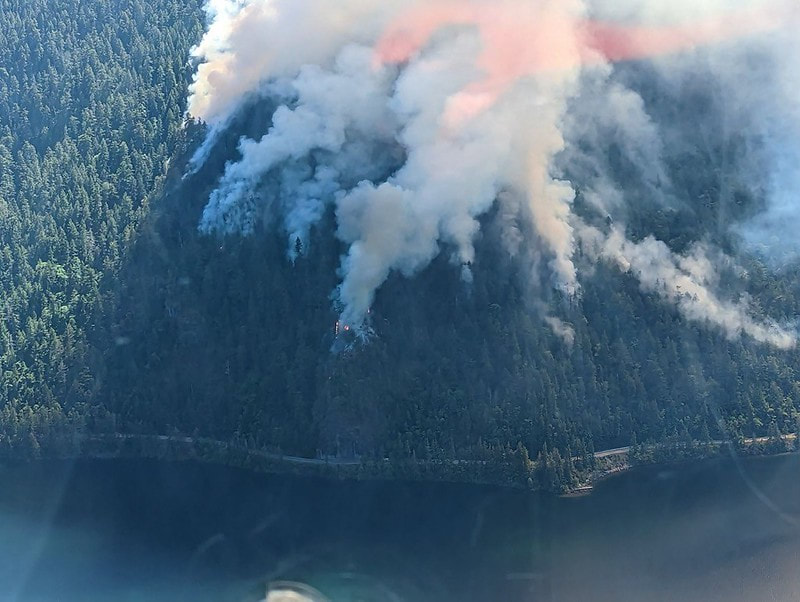|
An initiative that was adopted early by Greater Victoria businesses is now in effect across the province. As of July 15, plastic shopping bags and single-use products are no longer allowed to be offered to customers anywhere in BC.
The province estimates that British Columbians threw out more than 340,000 tonnes of plastic items and packaging in 2019, equal to more than 65 kilograms of plastic waste per person. BC Hydro has announced new rebates for the installation of rooftop solar and battery-storage systems. The rebates could save homeowners as much as $10,000. The Crown corporation generates energy for 95% of British Columbians.
The Chamber supports Climate Action Leadership, such as the work being done to transition the province to sustainable power sources. BC Hydro is also planning rebates of up to $150,000 for businesses, local governments and others. More details on that plan will be available later this month. Currently, 98% of the power generated for BC's integrated grid comes from clean or renewable resources. On Monday, the federal government announced $530 million to help Canadian municipalities adapt to the changing climate. The money will help cities and towns prepare for flooding, heat domes and other impacts on residents and infrastruture caused by weather events.
The Federation of Canadian Municipalities will administer the fund, which is a fraction of the $10 billion the FCM estimated is needed. "In all, there are three funding streams that will provide substantial support for municipalities to carry out climate adaptation projects. In addition to support for climate adaptation planning, municipalities can apply for up to $1 million for implementation projects and up to $70,000 for feasibility studies," the media release said. "Municipalities that have completed climate adaptation plans and/or risk assessments are eligible to apply. The deadline for applications is Aug. 14, 2024." Greater Victoria's two largest municipalities continue to show they can play nice with each other. The latest example is a joint media release regarding mutual initiatives that incentivize owners of rental buildings to convert to electric power.
"The City of Victoria and the District of Saanich recently announced tax exemption programs that support electrification retrofits in rental buildings, the first initiative of its kind in British Columbia," the release stated. "In tandem, the municipalities have partnered with Landlord BC and BC Hydro to expand the Rental Apartment Retrofit Accelerator (RARA) Program, initiated in Vancouver in 2023." The mayors of Victoria and Saanich said the programs will help reduce fossil fuel consumption in the region, and provide access to summer cooling during future heat waves. A new hub close to the "heart of Saanich" was given a key stamp of approval on Monday.
The District of Saanich has an extensive plan for the Uptown-Douglas area, which is at the crossroads of Greater Victoria's core municipalities. The area will be zoned to shape new development designed to grow the neighbourhood as a major hub north of downtown Victoria and between the West Shore and Saanich Peninsula. The plan includes turning Oak Street into a vibrant commercial district that creates a walkable boulevard between Uptown Mall and Mayfair Shopping Centre. The City of Victoria is updating its Official Community Plan this year. The province requires all BC municipalities to update their OCP every five years with a vision for the next 20 years. Victoria — facing a changing climate, growing population and a profound shortage of housing — is looking for input from the public and business community to help shape the next plan.
"Decisions on where housing, businesses and parks should go, how we move around the city and ways Victoria can respond to the climate crisis are all determined by the OCP," states the city's website. "If the City was a train, the OCP would be its conductor leading the way." Community engagement will continue until September and plans currently include an open house, a survey, pop-up events in the city and an online information session. Learn more at engage.victoria.ca/ocp. The District of Saanich's plan for the area around Uptown received a boost on Monday as the province announced it has secured land for a new transit-oriented development.
“Our communities are growing quickly, and people need affordable homes close to public transit, so they can get to where they need to go – and get ahead in life,” said BC Premier David Eby, who will be speaking to Chamber members on April 30. “This new development in Saanich will create a vibrant, connected community where people can find everything they need at their doorstep.” The land was bought by the BC Ministry of Transportation and Infrastructure’s $394-million property acquisition fund. Early plans for the area in Saanich include hundreds of new homes, public spaces and active-transportation connections. There will also be new retail and commercial spaces. Other suggested services include child care, community health and educational facilities. The development will integrate the Lochside and Galloping Goose regional trails to make it a hub for active transportation and BC Transit services, with connections to downtown Victoria, the University of Victoria, the Westshore and the Saanich Peninsula. “The Uptown-Douglas area is the perfect location for a high-density, transit-oriented development and regional transit hub that will no doubt be transformative for this community," Saanich Mayor Dean Murdock said in the news release. Luke Mari, principal of Aryze Developments commented on the announcement, saying “The best transportation plan is a land-use plan. When we put the right homes in the right places – near existing services amenities and transit – we can reduce our dependence on private car use.” The future of BC Ferries is easier to visualize, now that concept drawings of proposed new vessels have been released. Up to seven of the new ships are expected to be ready for service in 2029.
On Monday, BC Ferries issued a Request for Supplier Qualification for its New Major Vessels program, with the aim of issuing a Request for Proposals this summer. The new vessels will carry up to 360 standard sized vehicles and 2,100 people, and will replace vessels currently operating between Vancouver Island and Metro Vancouver. Those ships have a capacity of 250-310 vehicles and 1,200-1,500 people. “These vessels — greener, more efficient and standardized — represent the future of ferry travel in our province," BC Ferries’ President and CEO Nicolas Jimenez said. "They will significantly increase daily capacity, provide an enhanced customer experience, improve reliability and reduce environmental impacts.” The basic design is being developed in collaboration with LMG Marin AS, and will have engines capable of using bio- and renewable fuels, as well as a battery-hybrid propulsion system that can be converted to full battery-electric operation once shore-based recharging infrastructure becomes available. Indigenous knowledge is an invaluable resource for our region, especially when it comes to improving environmental sustainability.
"Innovation led by business is key to effective Climate Action Leadership, and investing in Nations that are doing the work to improve their communities is the right thing to do," Chamber CEO Bruce Williams said. The province's First Nations Clean Energy Business Fund is providing three communities on the South Island with more than $792,000. T’Sou-ke Nation will receive $492,910 to build and install a solar photovoltaic system, and Malahat Nation will get $149,646 to install heat pumps in priority homes as well as to conduct a band office energy assessment and a rooftop solar photovoltaic system screening. Pacheedaht First Nation is getting $149,961 to help install surge protectors and improve insulation. The next intake for the FNCEBF program closes April 30. There can be no doubt about it, Greater Victoria loves hockey. That was on full display last week as the many communities that have a connection to the sport came together for a celebration of Canada’s game.
Scotiabank Hockey Day in Canada was a major success, raising community spirits and bringing activity to businesses downtown and across the region. The mid-January festival took place over four days last week, with the official "hockey day" bringing 20,000 people to Ship Point in the Inner Harbour on Saturday. "We heard reports that it was like a summer day for tourism," Chamber CEO Bruce Williams said, noting that $100,000 was raised for the Courtnall Society for Mental Health. The impact on tourism is still being assessed, as more than nine million Canadians saw images and stories of Greater Victoria during a full-day of NHL broadcasts on Sportsnet. “Civic pride was the big thing here,” Williams told the Times Colonist. “We were successful because people came together and really celebrated the game we love so much.” The Chamber was among many organizations that stepped up to sponsor the event. South Island Prosperity Partnership's CEO is stepping down on March 15 for a business opportunity.
Emilie de Rosenroll is the founding CEO of SIPP, which has its roots in an Economic Development Committee started by The Chamber before becoming its own organization in 2016. The Rising Economy Taskforce and the Centre for Ocean Applied Sustainable Technology (COAST) are among de Rosenroll's achievements. “On behalf of the SIPP Board of Directors, I am very grateful for the tremendous contribution Emilie has made to the organization and region,” SIPP's Board Chair Frank Bourree said. SIPP is working with an executive search firm to help find its next CEO. Provincial regulations announced in the summer are set to take effect this month, banning certain single-use plastics in BC. The rules aim to prevent single-use and plastic waste, divert more waste from landfills and keep consumer products working longer.
Starting Dec. 20, businesses can't use:
By customer request only or from a self-service station:
The Chamber supports innovation done by business to meet public demands and reduce waste. We will continue to work with regulators to ensure regulations address the changes already implemented by businesses championing climate action leadership. They're a common sight in many cities around the world, but will e-scooters find their niche as part of the transportation puzzle facing many BC communities? The province announced today that it will begin a new safety review in April to continue the work of a pilot program that started back in 2021.
In places where motorized scooters are available, they have been shown to reduce the use of larger vehicles while supporting other modes of public transportation. The pilot project was done in 13 BC communities, with Nanaimo the only Island city. The next phase will run for four-years in any BC community that authorizes their use. Those communities will be able to prescribe where electric scooters can be used, subject to new regulations. "During the next phase of examination, the Ministry of Transportation and Infrastructure will lead an ongoing safety evaluation, together with government partners, ICBC and the BC Injury Research and Prevention Unit," the ministry stated in a media release. "This work will complement safety evaluations supplied by communities participating in the review." Chamber member Origen Air's founder and CEO has won a prestigious business award. The Stevie Awards were created in 2002 and have grown to become a coveted prize covering a number of sectors. Origen Air's Susan Blanchet won gold in the Stevie Awards for Women in Business under the category Female Thought Leader of the Year - Business Products.
"Founded in 2019, Origen Air is driven by a deeply personal commitment to improving indoor air quality and well-being," states Origen Air's LinkedIn post announcing the award. "By securing exclusive global distribution rights to genetically enhanced golden pothos plants developed at the University of Washington, Origen Air offers a revolutionary solution for removing man-made toxins from indoor air at an exceptional rate." The Chamber is a strong advocate for innovation led by business as the key to climate action leadership, and we applaud Susan and her team at Origen for their work to make office environments healthier. The Chamber advocates for Climate Action Leadership as businesses adapt and respond to changing expectations for seasonal weather events. Updated provincial legislation will help modernize the ability of businesses and their communities to better respond to emergencies and disasters.
British Columbia's new Emergency and Disaster Management Act will replace the Emergency Program Act, which is almost 30 years old. "Including Indigenous knowledge — by developing regulations in consultation with First Nations — is important and something The Chamber fully supports as work toward a sustainable future," Chamber CEO Bruce Williams said. "The climate has changed and we will continue to experience extreme weather events every year. This, of course, goes beyond borders and even local planning needs to consider the global context." The changes align with the international agreement to protect communities from climate events. For more , go to the United Nations Office for Disaster Risk Reduction. The best time to prepare for emergencies is before they happen. With summer's heat waning and the rains yet to fall this autumn, The Chamber is working on strategies to help businesses be ready for future climate events.
"Through our Public Policy and Advocacy committee and my conversations with Chamber members, we have recognized that the reality of doing business is planning for the unexpected," Chamber CEO Bruce Williams said. "We want to see businesses have strong representation on the recently announced task force that the Premier is planning to support people affected by climate emergencies." The expert task force on emergencies will work to determine how the province can better support communities facing wildfires, flooding and other climate events that are now expected to regularly occur. If you're a chamber member interested in learning more about planning for climate change, or a business that can help others prepare, email [email protected]. We'll keep you posted on Chamber's initiatives. Travel restrictions are being lifted tonight for many areas of Interior BC devastated by wildfires, but for people and businesses forced to flee their homes recovery will take time.
“The emergency order we put in place on Saturday has had the effect we required and thousands of hotel rooms were made available for people forced from their homes, as well as the many firefighters and emergency crews who are protecting us during the worst wildfire season in our history," BC's Minister of Emergency Management and Climate Readiness said in a news release. The Chamber has been in conversation with affected chambers to offer support during this difficult time. "We know that Greater Victoria is an exceptionally compassionate and generous community," Chamber CEO Bruce Williams said. "There are ways to help now, and there will be a need to help communities as they work to recover from so much loss." How to help: The board of the Capital Regional District has agreed to a $53.5 million plan that will widen and add lighting to sections of the Galloping Goose and Lochside regional trails. The sections are on the Galloping Goose between the Selkirk Trestle and Grange Road, and the Lochside Trail between the Switch Bridge and Borden Street.
The plan was developed over several years through public engagement. About three million people use the trails per year and the CRD says user volumes "will increase significantly due to trends in population growth and a shift toward active transportation and healthy lifestyles." Cyclists account for about 80% of traffic on the trail, compared to 20% for pedestrians. The City of Victoria has added an electric fire truck to its growing fleet of electric vehicles. The Rosenbauer Revolutionary Technology pumper fire engine, currently being assembled, is expected to arrive by the end of the year. Funding from the provincial government allowed the city to purchase the electric fire engine for about the same cost as a typical fire engine.
Vancouver and Brampton are the only other fire departments in Canada that have ordered RT electric fire engines, which are in use in Los Angeles, Berlin, Amsterdam and Dubai. A panel of experts has been tasked with developing a Community Safety and Well-Being Plan for the City of Victoria. The goal is to address multiple complex issues such as "declining civility and social cohesion, increasing social disorder, inadequate housing supply and homelessness, poverty, inequality, addictions, mental and physical health challenges, criminal activity and other factors."
The panel will work over the next 15 months to advise Victoria council on immediate interventions as well as long-term solutions. "I’m in frequent contact with the business community throughout the downtown and beyond and I’m consistently hearing that the impact of the pandemic is far from over," Fort Properties Ltd. CEO/co-owner Suzanne Bradbury said in the city's news release. "I believe that this is the right initiative at the right time and I’m honoured to bring a small business perspective.” Along with Bradbury, the panel includes:
In Greater Victoria, The Chamber serves as the voice of business by amplifying what we hear from our members. We can then further raise the volume by working with our national network to include the questions and concerns of more than 200,000 businesses across Canada.
A recent example is the 2024 pre-budget recommendations submitted by the Canadian Chamber to the federal government. The submission calls for for investment in trade-enhancing infrastructure, easing the burden of doing business, facilitating the transition to net-zero, enabling an innovative economy, attracting and retaining talent and taking a lead role in life sciences. To learn more about the work done by The Chamber's Public Policy and Advocacy committee, contact [email protected]. The provincial government has expanded rules to further reduce the use of hard-to-recycle plastics. The Single-Use and Plastic Waste Prevention Regulation will cover "shopping bags, disposable food service accessories, oxo-degradable plastics and food service packaging made of polystyrene foam, PVC, PVDC, compostable or biodegradable plastics."
The requirements begin to take force in December to allow time for businesses to use up existing inventory. The federal government has already announced sales of these items will be banned as of Dec. 20. Island communities cut off by wildfires received some good news as the province announced Highway 4 will reopen to limited single-lane travel starting this weekend.
Fallen trees and debris that had been blocking the route have now been cleared. As well, mesh curtains suspended by cranes are being deployed to protect passersby as the impacted slope continues to settle alongside the highway. An alternate route continues to be used by about 1,000 vehicles daily, helping ensure essential goods are available. Tourism support includes increased flights so that visitors can bypass the affected road. A report released yesterday from the Canada Energy Regulator says that electricity will take a lead role in reshaping the future of the country.
Canada’s Energy Future 2023: Energy Supply and Demand Projections to 2050 offers three scenarios based on the pace of climate leadership in the years ahead. Two of the scenarios have Canada reaching net zero greenhouse gas emissions by mid-century. To accommodate the shift, Canada will need to generate more energy from wind, nuclear and hydro. The situation is still uncertain for Vancouver Island communities that have had their main transportation routes cut off by wildfire.
Highway 4, connecting Tofino and Ucluelet with Port Alberni and the rest of the Island, remains closed after fire burned more than two square kilometres of forest along the route. "Right now, our thoughts are with everyone in those Island communities," Chamber CEO Bruce Williams said. "The alternate routes are for essential traffic only. They're needed to ensure supplies and emergency personnel can get through. So we're working with our friends at 4VI to encourage people who had planned trips to impacted communities to consider other Island destinations that remain open." Yesterday, the Alberni Valley Chamber of Commerce relayed that they're trying to stay optimistic. However, businesses will be challenged until they are able to fully reopen. “(We're) really pleased to hear that the fire is now being held, so that gives some businesses time to arrange for alternative arrangements for things coming in, but this is definitely going to be hard on the community,” Alberni Chamber CEO Jolleen Dick told CHEK News. |
Categories
All
|
Copyright © 2021 Greater Victoria Chamber of Commerce. All rights reserved.
#100 – 852 Fort St., Victoria, BC V8W 1H8, Canada | Phone: (250) 383-7191
[email protected] | Site Map
#100 – 852 Fort St., Victoria, BC V8W 1H8, Canada | Phone: (250) 383-7191
[email protected] | Site Map
Notice a typo or broken link? Please let us know so we can fix it ASAP. Email [email protected]




